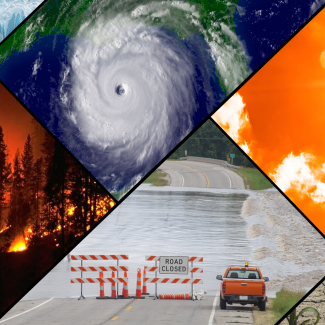September 19-21, 2023: 5th NOAA AI Workshop on Leveraging Artificial Intelligence in Environmental Sciences
Video recordings offsite link available for sessions (click on "Watch Recording")
Opening Plenary: State of AI in Environmental Sciences
This year’s interactive, virtual workshop focused on collaboration building and active development of AI-powered applications and community standards. We invited developers, data scientists, domain experts, social scientists, and downstream users to form small teams around different use cases that are relevant to NOAA mission areas. This workshop collaborated around two themes:
- Benchmarking Framework: AI research and development in environmental sciences require a benchmarking framework to ensure objective evaluation and accelerate adoption. The discussion around benchmarking framework will include high-priority application areas that are relevant to NOAA mission areas, AI-ready data sets, baseline models, desired performance metrics, cataloging mechanisms, and governance needs.
- Research-to-Operation-to-
Research (R2O2R) : R2O2R is a critical process to enable research and development activities to be transitioned into operational environments while evolving operational needs can further inspire new research. The workshop will focus on identifying the challenges caused by the differences, if any, between the R2O2R processes for AI and traditional applications that have been implemented by NOAA and the community.
Previous Workshops
An interactive workshop to build collaboration and initiate the active development of AI-powered applications and community standards, focusing on three themes: fire weather and impacts, AI in ocean conservation, and interoperable Digital Twin Earth. September 4-9, 2022, virtual.
The third event continued the successes of previous workshops and encouraged participation by scientists, program managers, and leaders from the public, academic and private sectors who work in AI and environmental sciences. The theme was “Transforming Weather, Climate Services, and Blue Economy with Artificial Intelligence.” September 13-17, 2021, virtual.
The workshop consisted of weekly events including: extended presentations, mini sessions, panel discussions, tutorials, and networking opportunities. This WiSM (Workshop in Slow Motion) took advantage of the virtual format and reserved time for the development of presentations and Q&As sessions. July 30, 2020 - February 25, 2021, virtual.
The workshop gathered scientists, program managers, and leaders from the public, academic and private sectors. It enabled experts involved in the development and adaptation of AI tools and applications in a number of fields to meet and exchange experiences. April 23-25, 2019, College Park, MD.






